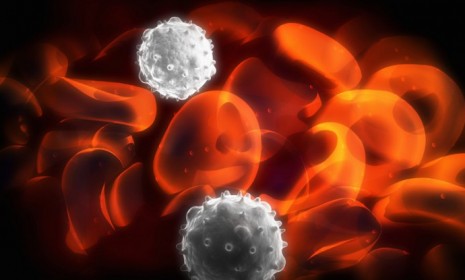Breakthrough: Can designer T cells cure cancer?
A groundbreaking study suggests that a patient's own immune cells can be genetically re-engineered into tumor-targeting "serial killers"

Cancer researchers worldwide are heralding the results of a "sensational" new study, in which a team from the University of Pennsylvania showed that a cancer patient's own immune cells can be genetically re-engineered to target and kill cancer cells. Though it's a preliminary study involving only three patients with leukemia, the successful results have left typically staid medical researchers wildly buoyant. Here, a guide to this breakthrough:
How was this study conducted?
Blood samples were drawn from three people with chronic lymphocytic leukemia, an aggressive form of cancer that affects blood and bone marrow. The patients' T cells — a type of immune cell found in the blood — were then genetically re-engineered with a strict agenda: To find cancer cells and kill them. "We put a key onto the surface of the T-cells that fits into a lock that only the cancer cells have," says researcher Dr. Michael Kalos, as quoted in the Vancouver Sun. The modified T cells were then infused back into the patients' blood.
The Week
Escape your echo chamber. Get the facts behind the news, plus analysis from multiple perspectives.

Sign up for The Week's Free Newsletters
From our morning news briefing to a weekly Good News Newsletter, get the best of The Week delivered directly to your inbox.
From our morning news briefing to a weekly Good News Newsletter, get the best of The Week delivered directly to your inbox.
What happened to the patients?
The results were so dramatic, even the doctors were shocked: "Within three weeks, the tumors had been blown away, in a way that was much more violent than we ever expected," says researcher Carl June. Moreover, these patients' tumors were in an advanced stage, and the prognoses were quite negative. Following the treatment, however, "we saw massive reduction in tumour burden," says Dr. Kalos. "One patient had over seven pounds of tumor and it all disappeared."
Could the cancer return?
It's possible. But the modified T cells — which essentially became "serial killers" — proved hearty, growing their numbers more than 1,000 times through reproduction, and surviving for months. Plus, the researchers programmed the cells to produce dormant offspring T cells that would spring back to life if the cancer ever returned.
A free daily email with the biggest news stories of the day – and the best features from TheWeek.com
How are the patients doing?
A year after the therapy started, two of the patients had complete remission of leukemia, and one had a partial response to the therapy — the patient's cancer is less severe. One of the patients wrote in a first-person essay, "I'm healthy and still in remission. I know that this may not be a permanent condition, but I decided months ago to declare victory and assume that I had won."
Are there any downsides to this new therapy?
Yes. The treatment is so strong that it can result in "tumor lysis syndrome" — chills, nausea, and fever — caused when a large number of cancer cells die very suddenly. Because tumor lysis syndrome can result in kidney failure, the condition requires prompt medical treatment.
What are other cancer researchers saying?
Most are very enthusiastic. "This is a huge accomplishment — huge," says Dr. Lee M. Nadler of Harvard Medical School, as quoted in the Los Angeles Times. Researchers have been struggling for decades to develop cancer treatments that use a patient's immune system to kill tumors with greater precision, leaving the rest of the body unharmed. "It is kind of a holy grail," says Dr. Gary Schiller of UCLA.
When will the new therapy be available?
Not for several years, if ever. Much more research needs to be conducted to ensure that this treatment is safe and effective. "The longer term toxicities and efficacy are not at all clear," said Dr. Bruce Chabner of Massachusetts General Hospital Cancer Center, as quoted by ABC News. "[This treatment] could be historic, but it will take several more years and many more cases before we know."
Sources: ABC News, CNN.com, LA Times, Medical News Today, Vancouver Sun
-
 Why quitting your job is so difficult in Japan
Why quitting your job is so difficult in JapanUnder the Radar Reluctance to change job and rise of ‘proxy quitters’ is a reaction to Japan’s ‘rigid’ labour market – but there are signs of change
-
 Gavin Newsom and Dr. Oz feud over fraud allegations
Gavin Newsom and Dr. Oz feud over fraud allegationsIn the Spotlight Newsom called Oz’s behavior ‘baseless and racist’
-
 ‘Admin night’: the TikTok trend turning paperwork into a party
‘Admin night’: the TikTok trend turning paperwork into a partyThe Explainer Grab your friends and make a night of tackling the most boring tasks